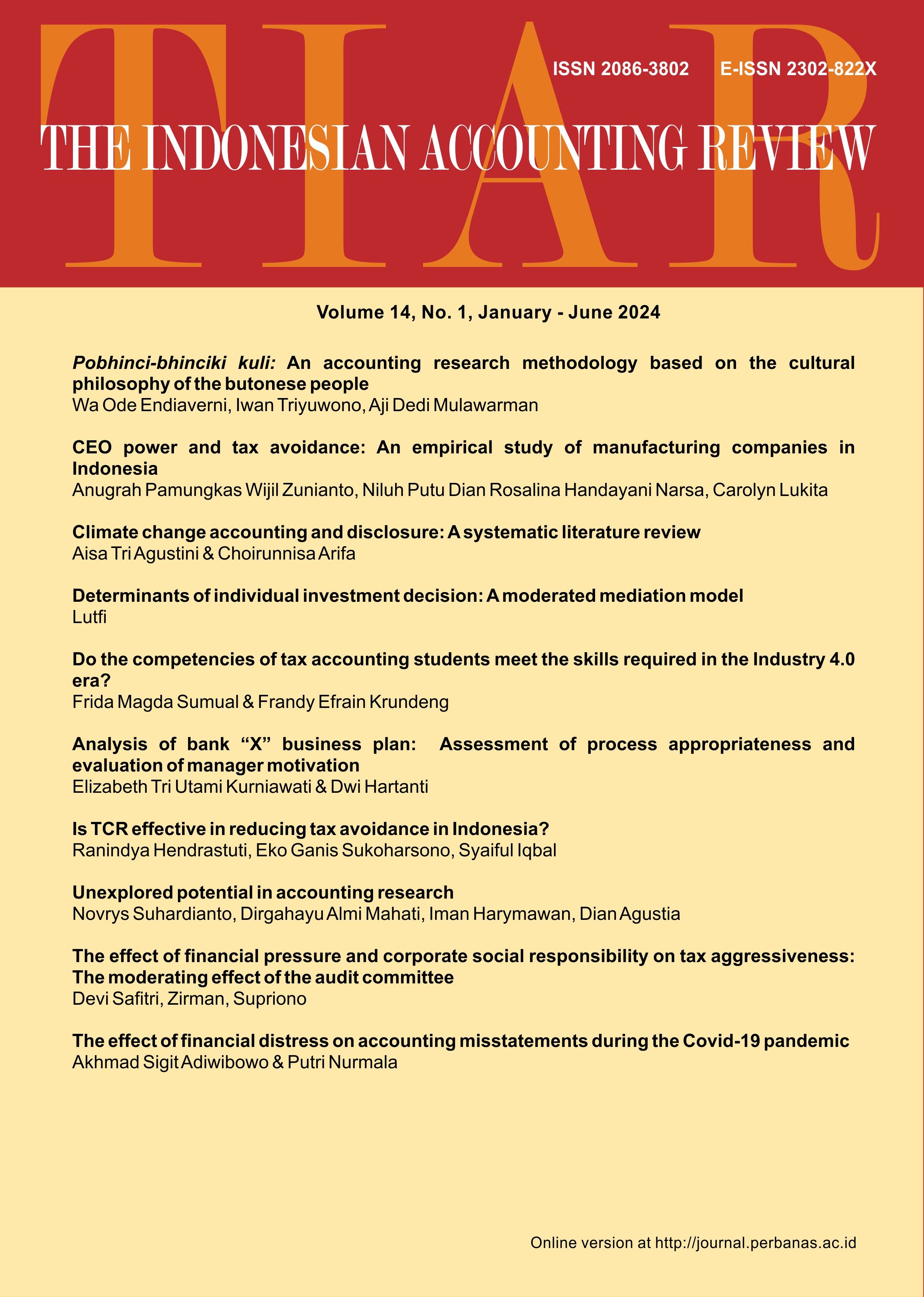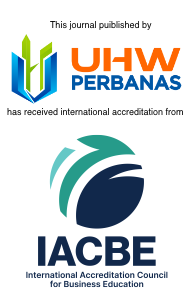The effect of financial distress on accounting misstatements during the Covid-19 pandemic
DOI:
https://doi.org/10.14414/tiar.v14i1.4398Keywords:
Financial distress, Accounting misstatement, COVID-19Abstract
This study aims to examine the effect of financial distress on accounting misstatements and to find out whether the COVID-19 pandemic moderates the relationship between financial distress and accounting misstatements. This study uses data from property and real estate companies listed on the Indonesia Stock Exchange (IDX) for the period from 2017 to 2021. The total research sample is 145 entities. The statistical methodology used in this study is panel regression analysis with the following steps: selecting the best regression model, classical assumption testing, and regression testing to determine coefficient values and significance levels. The results of this study show that financial distress has no significant effect on accounting misstatements. This study also finds empirical evidence that the COVID-19 pandemic does not moderate the relationship between financial distress and accounting misstatement. Although accounting misstatements have been a research topic for many years, little attention has been paid to their impact on companies experiencing financial distress and crises. Further research still needs to be carried out regarding the impact of the COVID-19 pandemic on the relationship between financial distress and accounting misstatement using a sample of companies that have a high multiplier effect. It is hoped that the results of this study can provide additional references to prove that agency theory and prospect theory can explain accounting misstatements.
References
Agrawal, K., & Chatterjee, C. (2015). Earnings Management and Financial Distress: Evidence from India. Global Business Review, 16, 140–154. https://doi.org/10.1177/0972150915601928.
Ahmed, K., Godfrey, J. M., & Saleh, N. M. (2008). Market perceptions of discretionary accruals by debt renegotiating firms during economic downturn. International Journal of Accounting, 43(2), 114–138. https://doi.org/10.1016/j.intacc.2008.04.002.
Alia, M. A., Abdeljawad, I., & Yaaqbeh, M. (2020). Depressing earnings management in Palestinian corporations: The role of audit quality, audit committee, and accounting conservatism. International Journal of Revenue Management, 11(3), 213–236. https://doi.org/10.1504/IJRM.2020.109419.
Altman, E. I. (1968). Financial Ratios, Discriminant Analysis and the Prediction of Corporate Bank-ruptcy. The Journal of Finance, 23(4), 589–609. https://doi.org/10.1111/j.1540-6261.1974.tb00057.x.
Asif, S., Shahzad, M., & Rehman, U.-U.-. (2023). Is Pakistan’s Financial Distress Guilty of Accounting Misrepresentation? A Manager’s Mediating Role Due to Overconfidence. Qlantic Journal of Social Sciences and Humanities, 4(3), 363–372. https://doi.org/10.55737/qjssh.003525438.
BI. (2021). Bauran Kebijakan Bank Indonesia Tahun 2021: Mendorong Pemulihan Ekonomi Nasional, Menjaga Stabilitas. Bank Indonesia
Bartov, E., Givoly, D., & Hayn, C. (2001). The rewards to meeting or beating earnings expectations. Journal of Accounting and Economics, 33(2), 173–204.
Beneish, M. D. (1999). The Detection of Earnings Manipulation. Financial Analysts Journal, 55(5), 24–36. https://doi.org/10.2469/faj.v55.n5.2296.
Bisnis.Com. (2022, April 7). Dukungan Nyata Pemerintah Bangkitkan Industri Properti. Bisnis.Com. https://ekonomi.bisnis.com/read/20220407/47/1520309/dukungan-nyata-pemerintah-bangkitkan-industri-properti.
Campa, D., & Camacho-Miñano, M. del M. (2015). The impact of SME’s pre-bankruptcy financial distress on earnings management tools. International Review of Financial Analysis, 42, 222–234. https://doi.org/10.1016/j.irfa.2015.07.004.
Charitou, A., Lambertides, N., & Trigeorgis, L. (2007). Managerial discretion in distressed firms. British Accounting Review, 39(4), 323–346. https://doi.org/10.1016/j.bar.2007.08.003.
Chen, L., Krishnan, G. V., & Yu, W. (2018). The relation between audit fee cuts during the global financial crisis and earnings quality and audit quality. Advances in Accounting, 43(March), 14–31. https://doi.org/10.1016/j.adiac.2018.07.007.
Chen, Y., Chen, C. H., & Huang, S. L. (2010). An appraisal of financially distressed companies’ earnings management: Evidence from listed companies in China. Pacific Accounting Review, 22(1), 22–41. https://doi.org/10.1108/01140581011034209.
Chia, Y. M., Lapsley, I., & Lee, H. W. (2007). Choice of auditors and earnings management during the Asian financial crisis. Managerial Auditing Journal, 22(2), 177–196. https://doi.org/10.1108/02686900710718672.
Chintrakarn, P., Jiraporn, P., & Kim, Y. S. (2018). Did firms manage earnings more aggressively during the financial crisis? International Review of Finance, 18(3), 477–494. https://doi.org/10.1111/irfi.12135.
CNBC Indonesia. (2022, February 17). Wamenkeu Beberkan Dampak Pandemi Pada Sektor Properti. CNBC Indonesia. https://www.cnbcindonesia.com/news/20220217172657-4-316262/wamenkeu-beberkan-dampak-pandemi-pada-sektor-properti.
Cohen, D. A., & Zarowin, P. (2010). Accrual-based and real earnings management activities around seasoned equity offerings. Journal of Accounting and Economics, 50(1), 2–19. https://doi.org/10.1016/j.jacceco.2010.01.002.
Dechow, P. M., Ge, W., Larson, C. R., & Sloan, R. G. (2011). Predicting Material Accounting Misstatements. Contemporary Accounting Research, 28(1), 17–82. https://doi.org/10.1111/j.1911-3846.2010.01041.x.
Dechow, P. M., Sloan, R. G., & Sweeney, A. P. (1996). Causes and consequences of earnings manipulation: An analysis of firms subject to enforcement actions by the SEC. Contemporary Accounting Research, 13(1), 1–36. https://doi.org/10.1111/j.1911-3846.1996.tb00489.x.
Dimitras, A. I., Kyriakou, M. I., & Iatridis, G. (2015). Financial crisis, GDP variation and earnings management in Europe. Research in International Business and Finance, 34, 338–354. https://doi.org/10.1016/j.ribaf.2015.02.017.
Graham, J. R., Harvey, C. R., & Rajgopal, S. (2005). The economic implications of corporate financial reporting. Journal of Accounting and Economics, 40(1–3), 3–73. https://doi.org/10.1016/j.jacceco.2005.01.002.
Habib, A., Uddin Bhuiyan, B., & Islam, A. (2013). Financial distress, earnings management and market pricing of accruals during the global financial crisis. Managerial Finance, 39(2), 155–180. https://doi.org/10.1108/03074351311294007.
He, J. (2012). Institutional environment, ownership structure and accounting earning quality. In Proceedings of the 2012 National Conference on Information Technology and Computer Science, CITCS 2012 (pp. 1008–1012). https://doi.org/10.2991/citcs.2012.177.
Heba Ali, Amin, H. M. G., Mostafa, D., & Ehab K.A. Mohamed. (2022). Earnings management and investor protection during the COVID-19 pandemic: evidence from G-12 countries. Managerial Auditing Journal, 37(7), 775–797.
Kementrian Bidang Perekonomian Republik Indonesia. (2022, February 25). Pemerintah Dukung Pengembangan Sektor Properti untuk Penyediaan Hunian yang Layak bagi Masyarakat. https://www.ekon.go.id/publikasi/detail/3753/pemerintah-dukung-pengembangan-sektor-properti-untuk-penyediaan-hunian-yang-layak-bagi-masyarakat.
Kumar, M., & Vij, M. (2017). Earnings Management and Financial Distress: Evidence from India. Journal of International Business and Economy, 18(2), 84–101. https://doi.org/10.1177/0972150915601928.
Lara, J. M. G., Osma, B. G., & Neophytou, E. (2009). Earnings quality in ex-post failed firms. Accounting and Business Research, 39(2), 119–138. https://doi.org/10.1080/00014788.2009.9663353.
Li, Y., Li, X., Xiang, E., & Geri Djajadikerta, H. (2020). Financial distress, internal control, and earnings management: Evidence from China. Journal of Contemporary Accounting and Economics, 16(3), 100210. https://doi.org/10.1016/j.jcae.2020.100210.
Liberty, S. E., & Zimmerman, J. L. (1986). Labor Union Contract Negotiations and Accounting Choices. The Accounting Review, 61(4), 692–712.
Oskouei, Z. H., & Sureshjani, Z. H. (2021). Studying the relationship between managerial ability and real earnings management in economic and financial crisis conditions. International Journal of Finance and Economics, 26(3), 4574–4589. https://doi.org/10.1002/ijfe.2031.
Rahman, M. J., Ding, J., Hossain, M. M., & Eijaz Ahmed Khan. (2022). COVID-19 and earnings management: a comparison between Chinese family and non-family enterprises. Journal of Family Business Management, 13(2), 229-246. https://doi.org/10.1108/JFBM-01-2022-0011.
Ratna Nuraini. (2020, March 2). Kasus Covid-19 Pertama, Masyarakat Jangan Panik. Portal Informasi Indonesia. https://indonesia.go.id/narasi/indonesia-dalam-angka/ekonomi/kasus-covid-19-pertama-masyarakat-jangan-panik.
Rosner, R. L. (2003). Earnings Manipulation in Failing Firms. Contemporary Accounting Research, 20(2), 361–408. https://doi.org/10.1506/8EVN-9KRB-3AE4-EE81.
Rusmin, R., Astami, E. W., & Hartadi, B. (2014). The impact of surplus free cash flow and audit quality on earnings management the case of growth triangle countries. Asian Review of Accounting, 22(3), 217–232. https://doi.org/10.1108/ARA-10-2013-0062.
Strobl, G. (2013). Earnings manipulation and the cost of Capital. Journal of Accounting Research, 51(2), 449–473. https://doi.org/10.1111/1475-679X.12008.
Sumiadji, Chandrarin, G., & Subiyantoro, E. (2019). Effect of audit quality on earnings quality: Evidence from Indonesia stock exchange. International Journal of Financial Research, 10(1), 86–97. https://doi.org/10.5430/ijfr.v10n1p86.
Turyatini, T. (2017). The Analysis of Tax Avoidance Determinant on The Property and Real Estate Companies. Jurnal Dinamika Akuntansi, 9(2), 143–153. https://doi.org/10.15294/jda.v9i2.10385.
Xu, C., Zhang, H., Hao, J., & Guo, L. (2021). Real earnings management in bankrupt firms. Journal of Corporate Accounting Camp; Finance, 32(2), 22–38. https://doi.org/10.1002/jcaf.22483.
Downloads
Submitted
Published
How to Cite
Issue
Section
License
Copyright (c) 2024 The Indonesian Accounting Review

This work is licensed under a Creative Commons Attribution-NonCommercial 4.0 International License.

















